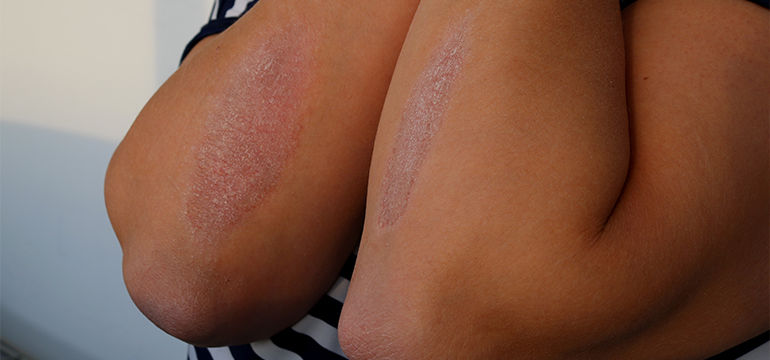- FREE Delivery on Orders Over £25
- Order by 2pm for Next Day Delivery
- UK Registered Pharmacy: 9011378
Signs you may have psoriasis

It affects celebrities including Kim Kardashian and Cara Delevingne, not to mention 2% of adults across the globe.
Psoriasis is a common skin condition that can range from a minor irritation impacting a small area of skin, to something more intrusive and serious.
What signs should you be looking for if you think you may be experiencing psoriasis?

Most common in under 35s
Psoriasis can begin at any age, but it most commonly becomes apparent in those aged under 35.
For most, it will involve a small patch of skin that is red and itchy.
In up to 90% of cases, the area of skin will be covered in silver scales, and will usually be found on elbows, knees or lower back.
It’s also possible for these patches to appear on your head (scalp psoriasis) and nails.
In theory, psoriasis can affect any part of the body and ranges in severity.
Men and women are at equal risk of experiencing it.

Diagnosis is simple
Most cases can actually be diagnosed by a GP just on appearance.
At that point, a course of treatment will be recommended to control the disease.
Often that will involve a cream or ointment which can be applied to the affected area, or a special shampoo if psoriasis is on your scalp.
It can take several weeks for this to have an impact, so don’t lose hope or patience if the remedy isn’t working as quickly as you’d like.
For more severe cases, or if creams aren’t working, there are options for more intense treatment, including oral and injected medications or exposing the skin to ultraviolet light.

Why does it happen?
Psoriasis is caused by an increased production of skin cells. While skin cells are generally replaced every three to four weeks, in patients with psoriasis that process happens far more regularly.
That leads to a build-up of skin cells, which in turn causes patches of red, itchy skin.
Is it contagious?
No. It cannot be spread from person to person. And while psoriasis can run in families, it is not yet known what the precise genetic link is.

Can it be cured?
There is no cure for psoriasis, but with creams and medication, it can be controlled.
It also comes and goes. Patients can live through long periods of having no visible sign of psoriasis whatsoever. Often, a flare-up of psoriasis can be triggered by an event, such as throat infections, a skin injury or even using certain other medications.
What can I expect from living with psoriasis?
For many people, psoriasis is little more than a minor and infrequent irritation.
But for others, it can have a bearing on the quality of life and knock self-esteem, as well as causing pain and discomfort.
Fortunately, as well as a range of treatments, there are a number of support groups that help people through diagnosis and the challenges psoriasis can pose for patients and their loved ones.




